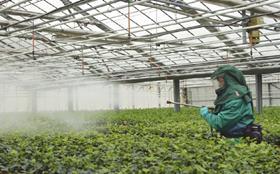
Updated on 14 January 2009 – added comment from Freshfel and Greenpeace
New legislation governing the use of pesticides in the European Union has today been approved my Members of the European Parliament (MEPs) following a second reading vote, with the aim of ensuring safer use in production and daily life.
Under the regulations, which must be implemented by member states by 2011, the number of pesticides available to member states will increase, but dangerous toxic chemicals in certain products will be banned.
As part of the new regulations, a positive list of approved 'active substances' that make up pesticides is to be drawn up at EU level, and will then be licensed at national level on the basis of inclusion on that list, the European Parliament explained in a statement. At the same time, highly toxic chemicals will be placed on a 'blacklist' and banned unless exposure to them would be 'negligible'.
Any substance needed to combat a serious danger to plant health may be approved for up to five years, even if it does not meet safety criteria. At the same time, plant protection products containing dangerous chemicals must be replaced within three years if safe alternatives are shown to exist.
'This agreement is a win-win situation, not only for the environment, public health and consumer protection but also the European economy, since it will lead to more innovation, placing the EU at the forefront of the sector,' said MEP Hiltrud Beyer.
The legislation, which must now be passed by the Council before possible definitive implementation in 2010, will allow individual states to adopt additional conditions or restriction on the use of new pesticides approved within their zone (either north, centre or south), with a product approval time limit of 120 days.
Non-chemical pest control methods such as crop rotation will be actively encouraged by the regulations, while aerial crop spraying in general will be banned. Member States must adopt national action plans for reducing 'risks and impacts' of pesticide use on human health and the environment, although MEPs dropped a demand for a specific reduction target of 50 per cent for chemical substances of particular concern in order to secure a deal with the council.
Pesticide Action Network (PAN) Europe welcomed the legislation, with spokesperson Elliot Cannell hailing the food safety aspect of the regulations with regards to European consumers.
'After nearly three year of discussions the EU is just a heartbeat away from eliminating dietary and occupational exposure to the worst carcinogenic and mutagenic pesticides,' he said. 'Today's vote is fantastic for consumers concerned that 50 per cent of food items sold in the EU currently contain pesticides.'
Friedhelm Schmider of the European Crop Protection Association (ECPA) said that the legislation would be largely welcomed by the industry, in particular elements such as the encouragement of integrated pest management and increased education for pesticide users, but warned that the implementation of 'cut-off criteria' on banned substances could severely dent farmers' crop protection options.
'Now the question arises of what further losses are in store for both the farmer's pest fighting portfolio and European food production as a result of the legislation,' he said. 'To some extent the loss of more useful substances without a scientific rationale could be avoided during the second reading. The decision-making so far has been done in the absence of a comprehensive impact assessment, which would certainly be very helpful in ensuring that the next steps are the right ones to safely secure Europe's food supply.'
Freshfel Europe's General Delegate Philippe Binard, told Fruitnet.com that while
the regulations had positive elements, significant challenges remained – particularly over blacklisted substances.
“Overall, there is a point of concern over when substances are to be withdrawn, and this could lead to confusion for the trade and for consumers,” he said. “Also, the measures
have not considered the impact that there could be on production, as the quality of produce could suffer.”
Elsewhere, the UK-based Fresh Produce Consortium (FPC) slammed the decision, claiming it had been made without a full assessment of the wider impact on food supply.
'Growers already have a limited range of products to protect horticultural crops, and in some instances there will be no viable alternatives for treating common pests which reduce yields and damage fresh produce.' said Nigel Jenney, chief executive of the FPC. 'It may become uneconomic to grow some crops such as sprouts and carrots, and lower yields will mean hard-pressed consumers will have to pay higher prices for their fruit and vegetables, including apples, pears, raspberries, leeks, peas and beans.'
And Manfred Krautter of lobby group Greenpeace slammed the legislation as “barely a start”, claiming that the regulations will leave European consumers exposed to “hundreds of harmful substances”.






No comments yet